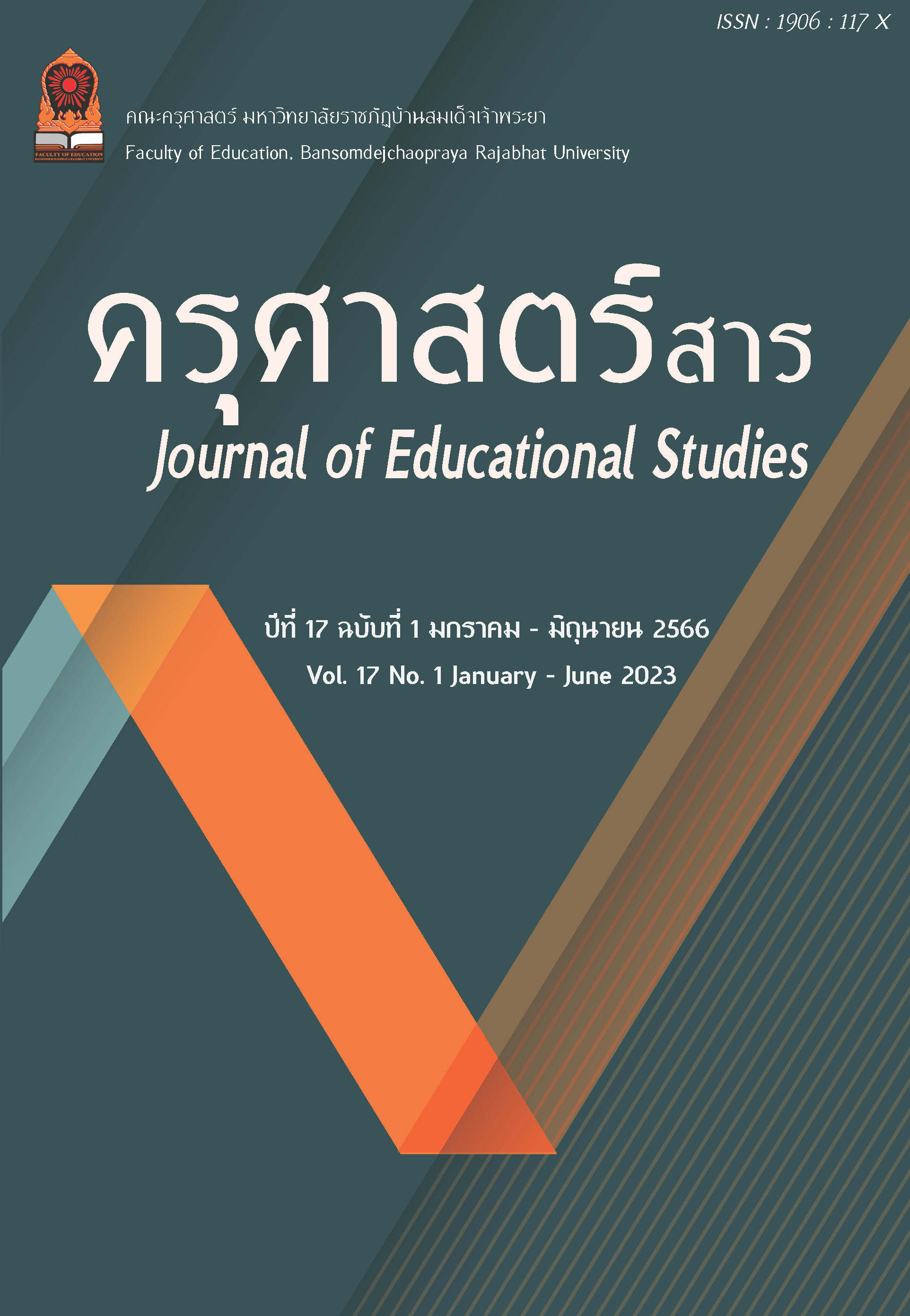Lessons Learned from Educational Quality Development and Local Development Projects with Higher Education Institutions as Mentors in The Lower Central Higher Education Network: The Case Study of Bansomdejchaopraya Rajabhat University
Keywords:
lesson learned, education quality, local development, mentors, Bansomdejchaopraya Rajabhat UniversityAbstract
The research objective of this article was to analyze factors affecting the quality of education and local development projects with higher education institutions as a mentor : the case study of Bansomdejchaopraya Rajabhat University during academic year 2016-2021. Key informants were stakeholders who involved the project and agreed to provide the data which was divided into two parts: the project organizer 4 people and the project participants 50 people, totaling 54 people. The research tools were the open-ended questionnaire, focus group discussion form and in-depth Interview form. Statistics for analyzing data was document analysis and content analysis. The results showed that The analysis results of 4 factors affecting the project were as follows: 1) The project funding factor; as they offered by the Ministry of Higher Education, Science, Research and Innovation. Each institution of higher education proposes a proposal for the project. If it was considered, then the project proposal would receive project funding. But if no funding offering or the project proposal was not approved, the project could not be prepared. 2) The expertise in higher education institutions factor. As the higher education institution had to determine the form of development activities in accordance with the needs of schools and expertise of higher education institutions. 3) The school participation factor; as the schools sent personnel to participate the project. And 4) The project participants’ obstacle factor. Participating teachers had the mission of teaching at school.
Downloads
References
คณะครุศาสตร์. (2560). รายงานผลการดำเนินโครงการพัฒนาคุณภาพการศึกษาและการพัฒนาท้องถิ่น โดยมีสถาบันอุดมศึกษาเป็นพี่เลี้ยงเครือข่ายอุดมศึกษาภาคกลางตอนล่าง ปีงบประมาณ 2559. กรุงเทพฯ: มหาวิทยาลัยราชภัฏบ้านสมเด็จเจ้าพระยา.
คณะครุศาสตร์. (2561). รายงานผลการดำเนินโครงการพัฒนาคุณภาพการศึกษาและการพัฒนาท้องถิ่น โดยมีสถาบันอุดมศึกษาเป็นพี่เลี้ยงเครือข่ายอุดมศึกษาภาคกลางตอนล่าง ปีงบประมาณ 2560. กรุงเทพฯ: มหาวิทยาลัยราชภัฏบ้านสมเด็จเจ้าพระยา.
คณะครุศาสตร์. (2562). รายงานผลการดำเนินโครงการพัฒนาคุณภาพการศึกษาและการพัฒนาท้องถิ่น โดยมีสถาบันอุดมศึกษาเป็นพี่เลี้ยงเครือข่ายอุดมศึกษาภาคกลางตอนล่าง ปีงบประมาณ 2561. กรุงเทพฯ: มหาวิทยาลัยราชภัฏบ้านสมเด็จเจ้าพระยา.
คณะครุศาสตร์. (2563). รายงานผลการดำเนินโครงการพัฒนาคุณภาพการศึกษาและการพัฒนาท้องถิ่น โดยมีสถาบันอุดมศึกษาเป็นพี่เลี้ยงเครือข่ายอุดมศึกษาภาคกลางตอนล่าง ปีงบประมาณ 2562. กรุงเทพฯ: มหาวิทยาลัยราชภัฏบ้านสมเด็จเจ้าพระยา.
คณะครุศาสตร์. (2564). รายงานผลการดำเนินโครงการพัฒนาคุณภาพการศึกษาและการพัฒนาท้องถิ่น โดยมีสถาบันอุดมศึกษาเป็นพี่เลี้ยงเครือข่ายอุดมศึกษาภาคกลางตอนล่าง ปีงบประมาณ 2563. กรุงเทพฯ: มหาวิทยาลัยราชภัฏบ้านสมเด็จเจ้าพระยา.
คณะครุศาสตร์. (2565). รายงานผลการดำเนินโครงการพัฒนาคุณภาพการศึกษาและการพัฒนาท้องถิ่น โดยมีสถาบันอุดมศึกษาเป็นพี่เลี้ยงเครือข่ายอุดมศึกษาภาคกลางตอนล่าง ปีงบประมาณ 2564. กรุงเทพฯ: มหาวิทยาลัยราชภัฏบ้านสมเด็จเจ้าพระยา.
ธิดารัตน์ ตันนิรัตร์. (2562). พฤติกรรมเกี่ยวกับการสร้างสื่อการเรียนการสอนหรือผลงานสร้างสรรค์ของนักศึกษาครู. ครุศาสตร์สาร, 13(2), 183-196.
ธิดารัตน์ ตันนิรัตร์. (2565). การประเมินความต้องการจำเป็นเกี่ยวกับการสร้างสื่อการเรียนรู้และการขอรับความคุ้มครองสิทธิบัตรของนักศึกษาครู. ครุศาสตร์สาร, 16(1), 236-247.
นโยบายและยุทธศาสตร์, สำนัก. สำนักงานปลัดกระทรวงศึกษาธิการ. แผนพัฒนาการศึกษาของ กระทรวงศึกษาธิการ ฉบับที่ 12 (พ.ศ.2560-2564). กรุงเทพฯ: สำนักนโยบายและยุทธศาสตร์ สำนักงานปลัดกระทรวงศึกษาธิการ.
พิมพ์พันธ์ เดชะคุปต์. (2550). ทักษะ 5C เพื่อการพัฒนาหน่วยการเรียนรู้และการจัดการเรียน การสอนแบบบูรณาการ. กรุงเทพฯ: โรงพิมพ์แห่งจุฬาลงกรณ์มหาวิทยาลัย.
รับรองมาตรฐานและประเมินคุณภาพการศึกษา (องค์การมหาชน), สำนักงาน. (2561). รายงานสรุปผลการประเมินคุณภาพภายนอกรอบสาม (พ.ศ. 2554-2559). กรุงเทพฯ: สำนักงานรับรองมาตรฐานและประเมินคุณภาพการศึกษา (องค์การมหาชน).
รับรองมาตรฐานและประเมินคุณภาพการศึกษา (องค์การมหาชน), สำนักงาน. (2565). รายงานสรุปผลการประเมินคุณภาพภายนอกรอบสี่ (พ.ศ.2559-2563). กรุงเทพฯ: สำนักงานรับรองมาตรฐานและประเมินคุณภาพการศึกษา (องค์การมหาชน).
สำนักงานคณะกรรมการพัฒนาการเศรษฐกิจและสังคมแห่งชาติ. (2562). ยุทธศาสตร์ชาติ ระยะ 20 ปี (พ.ศ. 2561-2580). พิมพ์ครั้งที่ 2. กรุงเทพฯ: สำนักงานคณะกรรมการพัฒนาการเศรษฐกิจและสังคมแห่งชาติ.
Andreasen, J. K., Bjørndal, C. R., & Kovač, V. B. (2019). Being a teacher and teacher educator: The antecedents of teacher educator identity among mentor teachers. Teaching and Teacher Education, 85, 281-291.
Aykan, A., & Yıldırım, B. (2022). The Integration of a lesson study model into distance STEM education during the covid-19 pandemic: Teachers’ views and practice. Technology, Knowledge and Learning, 27(2), 609-637.
Betlem, E., Clary, D., & Jones, M. (2019). Mentoring the Mentor: Professional development through a school-university partnership. Asia-Pacific Journal of Teacher Education, 47(4), 327-346.
Edu, T., Negricea, C., Zaharia, R., & Zaharia, R. M. (2022). Factors influencing student transition to online education in the COVID 19 pandemic lockdown: Evidence from Romania. Economic Research-Ekonomska Istraživanja, 35(1), 3291-3304.
Maphalala, M. C. (2017). Understanding the role of mentor teachers during teaching practice session. International Journal of Educational Sciences, 5(2), 123-130.
Rasmitadila, R., Humaira, M. A., Rachmadtullah, R., Sesrita, A., Laeli, S., Muhdiyati, I., & Firmansyah, W. (2021). Teacher Perceptions of University Mentoring Programs Planning for Inclusive Elementary Schools: A Case Study in Indonesia. International Journal of Special Education (IJSE), 36(2), 53-65.
Susanna, V. (2022). Information and Communication Technologies in Education. Eurasian Journal of Learning and Academic Teaching, 6, 89-93.
Tannirat, T., Songkram, N., Dulyakorn, V., & Upapong, S. (2022). The Implementation of Computational Thinking Books and Materials Set for Lower Primary School Students. Specialusis Ugdymas, 2(43), 3062-3067.
Wang, L. H., Chen, B., Hwang, G. J., Guan, J. Q., & Wang, Y. Q. (2022). Effects of digital game-based STEM education on students’ learning achievement: a meta-analysis. International Journal of STEM Education, 9(1), 1-13.
Downloads
Published
How to Cite
Issue
Section
License

This work is licensed under a Creative Commons Attribution-NonCommercial-NoDerivatives 4.0 International License.
บทความที่ได้รับการตีพิมพ์เป็นลิขสิทธิ์ของคณะครุศาสตร์ มหาวิทยาลัยราชภัฏบ้านสมเด็จเจ้าพระยา
ข้อความที่ปรากฏในบทความแต่ละเรื่องในวารสารวิชาการเล่มนี้เป็นความคิดเห็นส่วนตัวของผู้เขียนแต่ละท่านไม่เกี่ยวข้องกับมหาวิทยาลัยราชภัฏบ้านสมเด็จเจ้าพระยา และคณาจารย์ท่านอื่นๆในมหาวิทยาลัยฯ แต่อย่างใด ความรับผิดชอบองค์ประกอบทั้งหมดของบทความแต่ละเรื่องเป็นของผู้เขียนแต่ละท่าน หากมีความผิดพลาดใดๆ ผู้เขียนแต่ละท่านจะรับผิดชอบบทความของตนเอง



